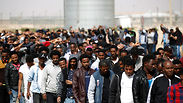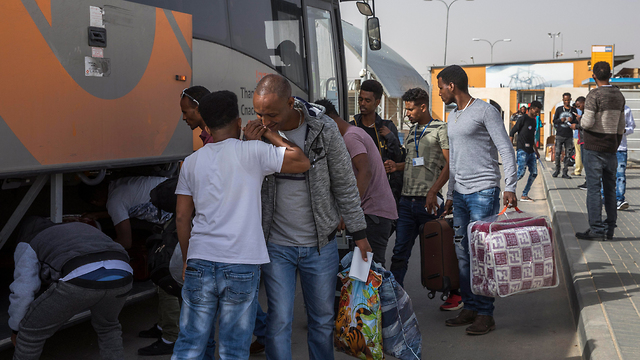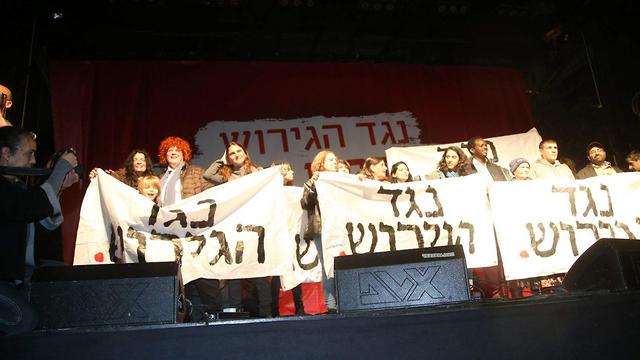

Asylum seekers: denied asylum, stuck doing jobs Israelis avoid
They came to Israel from African countries after a long and exhausting journey, filed a request for asylum and now they may find themselves deported. In the meantime, they have to support themselves with grunt work that often exposes them to exploitation.
Asylum seekers are now in limbo on whether they will be allowed to stay in Israel, while the state prepares to respond to the High Court of Justice's temporary injunction against their mass expulsion.
But allowing them to stay, though, will not mean an end to their woes.
Anwar Suleiman, 38, completed his bachelor's degree in archeology when the genocide began in Darfur 15 years ago.
He fled to Israel through Libya and Egypt. He has been in Israel for nine years, works in the kitchen of a small restaurant in Ramat HaSharon and dreams of continuing his academic studies.
"At work people are very nice to me, I found good friends. People do not go into politics with me, do not judge me by the color of my skin. If you respect your work, people are nice to you," he said.
Before working at the restaurant, he was imprisoned in the recently shuttered Holot detention center for asylum seekers, and before that he worked for two and a half years in a dining room in a hotel in Tel Aviv.
These jobs, he noted, are physically difficult and unpopular among Israelis.
"Most people do not want to work in these jobs, because it's hard labor," he acknowledged, adding "many Israelis fled (from working in the dining room—ed) because they had a hard time, they saw that it was not worth it.
"There is no future in this line of work. I do it because I have to, I have no other option," he lamented. "The Israelis I met that worked in restaurants did it as a temporary job, usually before the army to save some money for a trip (upon their discharge). No one is doing it looking to the future."
'I do not want to be a street cleaner all my life'
Osman Ali, 32, also had to flee the Darfur Genocide after the finishing his bachelor's degree in environmental management.
He arrived in Israel seven years ago after a long journey in Uganda, Kenya and Egypt. He applied for asylum four years ago and his request has not yet been answered.
After being incarcerated in Holot, he moved to Haifa and now works as a barber. At the same time, he serves as chairman of the African Refugee Development Center (ARDC), which helps foster leadership among asylum seekers in Israel.
"I do not want to be a book or a street cleaner all my life," he said sadly. "I'm a person who has dreams and hopes. I hope to live in a country that will accept me as I am and let me develop. When we lived in Sudan, before the war, we had no problem of finding employment. I am very proud of and love my country, but our government is committing genocide."
Tachlit Michael, 29, arrived in Israel in 2007 from Eritrea and also had to settle for grunt work, including in restaurant kitchens and a holding company.
"It was not easy, it takes a lot of mental and physical strength," he acknowledged. "When I worked in the kitchen I stood in front of open flame for about 10 hours a day. I saw a lot of people suffering and crying in these jobs. When I worked in the holdings company it was also difficult, the boss did not pay me for nearly three months."
Today, Michael invests most of his energies and time in the Eritrean community of asylum seekers. As part of his work, he encounters many exploitative stories of employers.
"People do not know the language and the laws so employers exploit them," he attested. "The asylum seekers are good people, they did not do anything (to deserve this treatment). They want a family, they want to self-fulfillment, yet they constantly feel that the state wants to steal right out of their pockets."
How do you respond to people who claim that you are migrant workers and that you have come to steal the jobs of Israelis?
Michael: "Let them say whatever they want, I know I did not come here for work. I asked for asylum and for four years the state has not responded to my request. But before I'm a refugee, I am a person first and deserve rights. I deserve protection.
"Two weeks ago I was in the Knesset and spoke to a senior Likud official—she laughed in my face. She asked why we did not ask for asylum and claimed that we are migrant workers. If she says that, how can I respond?
"The government does not want to deal with the asylum seekers; it only uses us for votes in the elections. They do not do anything for us or for the residents of southern Tel Aviv. No one talks about the fact that southern Tel Aviv was in distress 50 and 60 years ago."
Suleiman: "I am really surprised by the behavior of the state, which itself is comprised of refugees who came from all over the world. The government, though, knows very well who came to work and who came to ask for asylum.
"If I had come as a migrant worker, the state would not let me stay here even for a month. Why have we been left to stay here all these years? Because the state is bound by international laws."
Ali: "None of us is going to work in high-tech and steal Israeli jobs. No Israeli wants to work in cleaning or in a restaurant. Certainly not anyone who has an education.
"We actually provide Israelis with work—today there are more than 500 people working in immigration departments. If we were not here, they would have no work.
"Also, if I'm a migrant worker as some people think—why was I not given a work permit so I can actually work? I have to renew my visa every two months and I cannot work. This is a contradictory policy."
Do you like it here in Israel? Do you even want to stay here?
Ali: "If I had another option, I would not have stayed in Israel even one more day. But I have nowhere to go."
Suleiman: "I have been in Israel for 9 years due to my situation, I have no choice. I have no other options. I have not been home for 14 years. Even if I don't like it here, I have to cope and be strong, find my inner strength and stay alive. This is my situation".
Michael: "If I could go back to my country, I would go back. I love the Israelis, but what do I really have here? After returning to my country I would be happy to return to Israel—not to work or live here, but to come visit with my family."
Written in collaboration with Israel at Heart

















